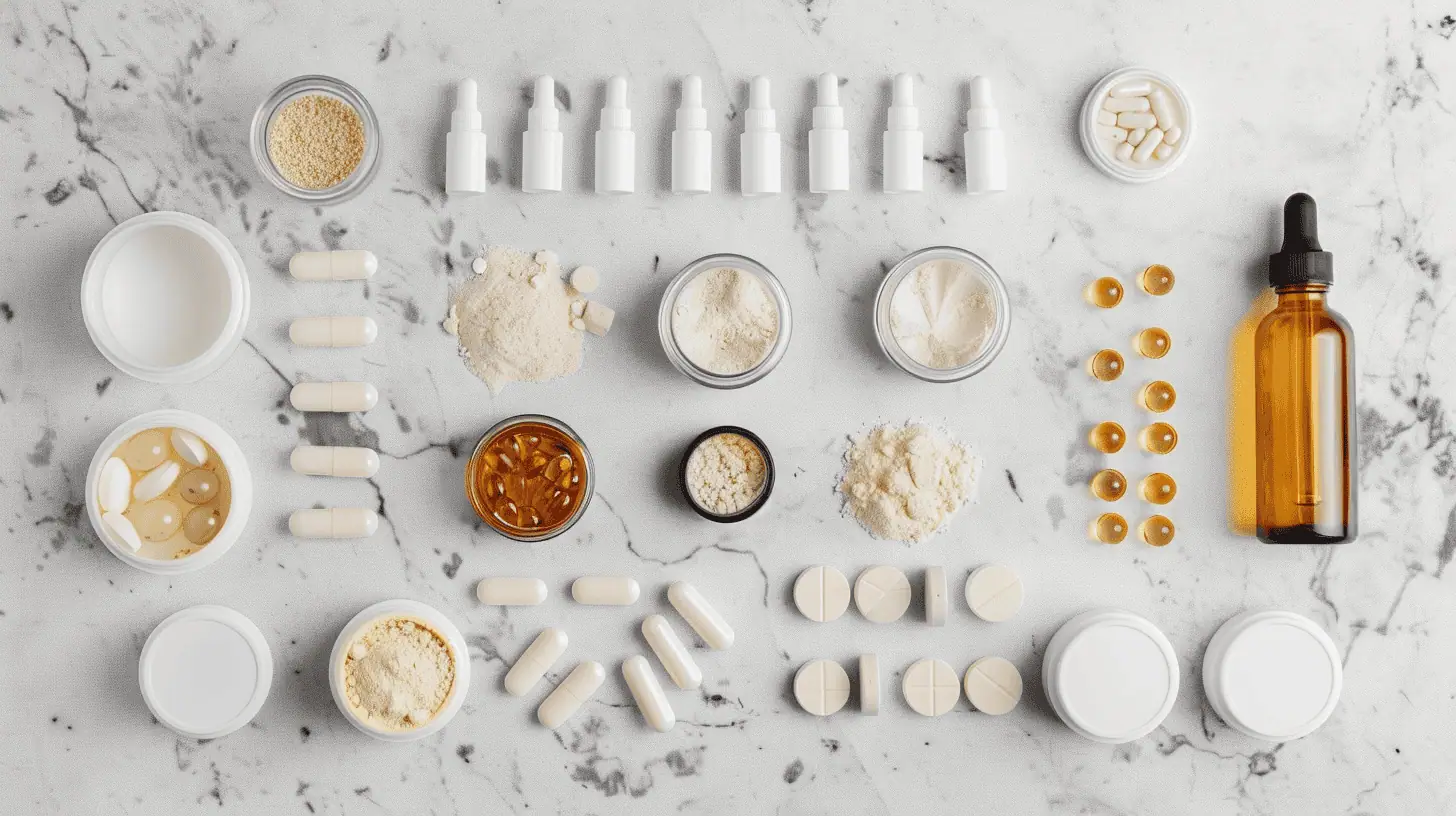Phone: (585) 902 2822
Email: info@jimmysuits.com
Tailored Elegance, Timeless Confidence.
Tailored Elegance, Timeless Confidence.

You’ll find collagen supplements can be highly beneficial for men, especially as natural production declines with age. These supplements support joint health, muscle recovery, and athletic performance while potentially preventing hair loss and improving skin elasticity. For best results, aim for 10-15 grams daily, preferably on an empty stomach or before workouts. You’ll need to pair it with vitamin C for better absorption, and consistency is key – expect to see initial benefits within 2-4 weeks. When choosing a supplement, look for hydrolyzed collagen from quality sources for maximum effectiveness. Understanding the different types and timing strategies can help maximize your results.

As men age, their natural collagen production begins to decline, typically dropping by about 1% each year after age 30. This gradual decrease affects various aspects of your body, from skin elasticity to joint health and muscle recovery.
Your body’s collagen synthesis process naturally slows down while collagen degradation continues, creating an imbalance that becomes more noticeable over time.
Several factors influence your body’s ability to produce collagen. Testosterone plays a vital role in collagen synthesis, and since men’s testosterone levels naturally decrease with age, this directly impacts collagen production.
Environmental factors like UV exposure, smoking, and poor nutrition can also accelerate collagen degradation, making it harder for your body to maintain ideal levels.
Your body produces collagen through a complex process that requires specific amino acids, particularly glycine, proline, and hydroxyproline. You’ll need adequate protein intake and various nutrients, including vitamin C, zinc, and copper, to support this process effectively.
When you’re younger, your body efficiently creates strong collagen fibers that maintain skin structure, support joint function, and help build lean muscle mass.
Understanding these mechanisms can help you take proactive steps to support your body’s collagen production. While you can’t completely stop the natural decline, you can slow it down through proper nutrition, lifestyle choices, and supplementation when necessary.
It’s essential to recognize that men’s collagen needs may differ from women’s, particularly in areas related to muscle maintenance and recovery.

Male athletes who supplement with collagen can experience significant performance and recovery benefits. When you’re training intensely, your body needs additional support for muscle repair and injury prevention. Collagen supplementation has emerged as a valuable tool in athletic performance enhancement, particularly for joint health and connective tissue strength.
You’ll find that collagen sources come in various supplement types, including powders, capsules, and protein bars. These supplements can help maintain skin elasticity and support your body’s natural recovery strategies after intense workouts. Research suggests that collagen supplementation may reduce joint pain and improve mobility, which is vital for maintaining peak athletic performance.
To maximize the benefits, you’ll want to take into account the dietary impacts of collagen intake. Taking collagen supplements before training can help protect your joints during high-impact activities.
It’s critical to maintain proper hydration levels when supplementing with collagen, as this helps with absorption and overall effectiveness. Many athletes report improved endurance enhancement when combining collagen supplementation with their regular training routine.
For best results, you should consume collagen about an hour before exercise, preferably with vitamin C to enhance absorption. This timing allows your body to utilize the amino acids effectively during training.
Whether you’re a professional athlete or a weekend warrior, incorporating collagen into your nutrition plan can support your athletic goals while helping to prevent common sports-related injuries and accelerating post-workout recovery.

Joint health becomes a primary concern for men as they age, building upon the athletic benefits previously discussed. Your joints naturally experience wear and tear over time, making collagen supplementation particularly valuable for maintaining mobility and comfort in your daily activities.
As collagen levels decline with age, you’ll notice increased stiffness and reduced joint flexibility, especially in weight-bearing joints like knees and hips. Collagen plays a significant role in maintaining your cartilage, the rubber-like tissue that protects your joints.
By supplementing with collagen, you’re providing your body with the building blocks needed to support cartilage regeneration and strength. Studies have shown that collagen can help reduce joint pain and improve mobility, particularly in people who engage in regular physical activity or those experiencing age-related joint issues.
Beyond basic joint support, collagen contributes to inflammation reduction throughout your body. This anti-inflammatory effect can help speed up recovery after workouts and reduce joint discomfort from everyday activities.
You’ll find that consistent collagen intake may help minimize morning stiffness and improve your overall joint function. For ideal joint health and recovery, you should aim to consume between 10-15 grams of collagen daily.
It’s most effective when taken about an hour before exercise or physical activity. You’ll enhance absorption by taking it with vitamin C-rich foods or supplements, as vitamin C aids in collagen synthesis. Remember that results typically become noticeable after 4-6 weeks of regular use.

Collagen protein’s role in muscle development extends beyond basic joint support, making it a valuable supplement for men focused on strength training and muscle growth. When you exercise, especially during resistance training, you create micro-tears in your muscle fibers. Your body then repairs these tears through protein synthesis, leading to stronger, larger muscles. Collagen plays an essential part in this rebuilding process by providing necessary amino acids.
While collagen isn’t typically considered a primary muscle-building protein like whey, it works synergistically with other proteins to enhance muscle recovery. Your body uses the amino acids from collagen to strengthen the connective tissues surrounding your muscles, including tendons and ligaments. This structural support is important for maintaining proper muscle function and preventing injury during intense workouts.
Studies suggest that combining collagen supplementation with resistance training can improve body composition and increase muscle strength. The glycine in collagen helps your body produce creatine naturally, which supports muscle energy during workouts. Additionally, collagen synthesis increases when you take the supplement about an hour before exercise, maximizing its benefits for muscle recovery.
You’ll find the best results by incorporating collagen as part of a thorough approach to muscle building. This means pairing it with adequate protein intake from various sources, following a structured strength training program, and maintaining proper nutrition.
For ideal muscle support, aim to consume 15-20 grams of collagen protein daily, preferably before your workout sessions.

Three key amino acids in collagen—proline, glycine, and hydroxyproline—play an essential role in maintaining healthy hair growth and preventing premature hair loss in men.
Your scalp health directly impacts your hair’s growth cycle and thickness. Collagen helps strengthen the dermal layer where your hair follicles are anchored, potentially reducing hair thinning and loss. You’ll find that collagen supplementation can support your body’s natural hair-building processes while protecting existing follicles.
| Hair Benefits | How Collagen Helps |
|---|---|
| Follicle Structure | Strengthens root attachment |
| Hair Growth | Provides building blocks |
| Scalp Health | Improves skin elasticity |
| Hair Thickness | Supports keratin production |
| Anti-aging | Fights free radical damage |
Research suggests that as you age, your natural collagen production decreases, which can contribute to hair thinning and loss. By maintaining adequate collagen levels, you’re supporting your body’s ability to produce and maintain healthy hair. Collagen supplements can help fill this gap, providing your body with the necessary proteins to support hair growth and maintenance.
You’ll notice that collagen’s benefits extend beyond just the hair shaft itself. It helps maintain the integrity of your scalp’s dermis, creating a favorable environment for hair growth. When combined with proper nutrition and hair care, collagen supplementation can be an effective strategy in your fight against hair loss, particularly if you’re experiencing age-related thinning or have a family history of male pattern baldness.

Beyond its role in hair health, your post-workout recovery can greatly benefit from proper collagen intake. When you exercise intensely, you create micro-tears in your muscles and stress your joints, making effective recovery strategies essential for maintaining peak performance and preventing injury.
Collagen plays an important role in supporting your connective tissues, including tendons and ligaments, which undergo significant stress during workouts. By incorporating collagen sources into your post-workout routine, you’ll support your body’s natural repair processes and potentially reduce recovery time between training sessions.
You’ll find that collagen supplementation can help minimize joint discomfort and improve mobility after intense workouts. Studies show that athletes who consume collagen regularly experience less joint pain and better recovery compared to those who don’t. This is particularly beneficial if you’re engaging in high-impact activities or strength training.
Your body’s natural collagen production decreases with age, making supplementation even more important for active men over 30. To maximize benefits, time your collagen intake about an hour before your workout. This guarantees the amino acids are available when your body needs them most for repair and recovery.
The most effective recovery strategies combine collagen supplementation with proper nutrition and rest. You can boost your intake through bone broth, chicken skin, and fish, or opt for high-quality collagen supplements.
When paired with vitamin C-rich foods, you’ll enhance your body’s collagen synthesis and improve your overall recovery process.

When shopping for collagen supplements, you’ll encounter several distinct types, each offering specific benefits for men’s health needs. The most common form you’ll find is hydrolyzed collagen, also known as collagen peptides, which has been broken down for better absorption by your body. These supplements come in various delivery methods to suit your lifestyle and preferences.
The primary forms of collagen supplements include:
You’ll also find plant-based collagen builders, which don’t actually contain collagen but provide nutrients that support your body’s natural collagen production.
While collagen injections exist, they’re typically used for cosmetic purposes and require professional administration.
The source of your collagen matters: bovine collagen offers types I and III collagen, beneficial for skin and joints, while marine collagen is rich in type I collagen and may be better absorbed.
Whatever form you choose, look for products containing hydrolyzed collagen for ideal absorption and effectiveness.

Most men should aim for 10-15 grams of collagen per day to see noticeable benefits, though your specific needs may vary based on factors like age, activity level, and health goals.
If you’re an athlete or regularly engage in intense workouts, you might benefit from increasing your intake to 15-20 grams daily to support joint health and recovery.
To maximize collagen absorption, it’s best to split your daily intake into two doses. You’ll want to take your collagen supplements either 30 minutes before or during meals that contain vitamin C-rich foods, as this nutrient enhances your body’s ability to process and utilize the collagen.
It’s also helpful to take your supplements consistently at the same times each day.
For specific goals, you can adjust your dosage accordingly. If you’re focused on muscle recovery and joint support, prioritize collagen types I and III, taking 10-15 grams post-workout.
For skin health and hair growth, you might benefit from 2.5-5 grams of types I and V taken in the morning. When targeting cartilage support, consider 10 grams of type II collagen.
Start with a lower dose of about 5-10 grams daily for the first week to assess your tolerance. You can gradually increase the amount until you reach your target dosage.
If you experience any digestive discomfort, reduce your intake and increase it more slowly.
Remember that consistency is key – you’ll need to maintain your collagen supplementation for at least 8-12 weeks to notice significant results.

The timing of your collagen intake can greatly impact its effectiveness. While you can take collagen at any time during the day, certain periods may enhance its absorption and benefits for your body. Understanding when to consume collagen supplements can help you maximize their potential for supporting your health goals.
Consider these strategic times for taking collagen:
You’ll also kickstart your day with sustained energy and improved focus.
Your body’s increased blood flow during workouts helps distribute the amino acids more effectively throughout your system.
It’s particularly effective when combined with protein-rich foods or supplements.
Your body’s natural repair processes peak during sleep, making this an ideal time for collagen to support tissue regeneration and skin health.
For best results, try to maintain consistency with your chosen timing.
You’ll also want to avoid taking collagen with coffee or other caffeinated beverages, as these might interfere with absorption.
Remember to wait at least 20 minutes after taking collagen before consuming other foods or supplements to guarantee maximum effectiveness.

Research linking collagen and testosterone reveals intriguing connections for men’s health.
Studies suggest that testosterone levels can influence your body’s collagen production, while collagen supplementation might support hormonal balance in return. Your body’s natural testosterone production plays a significant role in maintaining healthy collagen levels, which directly affects skin elasticity, joint health, and muscle recovery.
As you age, both testosterone and collagen levels naturally decline, creating a potential domino effect on your overall health. When testosterone drops, you might notice decreased collagen synthesis, leading to weaker connective tissues and slower recovery times. This testosterone impact on collagen production becomes more pronounced after age 30, when your body’s natural hormone production begins to slow.
The relationship works both ways. Research indicates that maintaining healthy collagen levels through supplementation may help create an environment that supports ideal testosterone production.
Collagen contains specific amino acids that your body uses to produce growth factors and hormones, including testosterone. You’ll find that glycine, one of collagen’s primary amino acids, may help support liver function, which is essential for healthy testosterone metabolism.
While collagen isn’t a direct testosterone booster, it’s part of a broader system that supports hormonal health.
If you’re looking to maintain both collagen and testosterone levels, consider combining collagen supplementation with resistance training, adequate sleep, and proper nutrition. This integrated approach helps maximize the benefits for your muscle mass, joint health, and overall well-being.

Selecting high-quality collagen products requires understanding three key factors: source type, processing methods, and additional ingredients. When you’re evaluating collagen quality, it’s crucial to choose products that align with your specific health goals and dietary preferences.
The source of your collagen matters greatly. Bovine collagen comes from cattle and provides types I and III collagen, while marine collagen is extracted from fish and offers superior bioavailability. You’ll want to verify that your chosen product uses premium sources and follows strict quality control measures.
Product ingredients should be straightforward and transparent. Look for supplements that list their protein content per serving and avoid those with unnecessary fillers, artificial sweeteners, or preservatives. The best collagen products typically contain minimal additional ingredients beyond the collagen protein itself.
To confirm you’re getting the best value for your investment, consider these critical factors:
Processing methods impact the supplement’s effectiveness considerably. Hydrolyzed collagen peptides are broken down into smaller, more digestible molecules, making them easier for your body to absorb and utilize.
Choose products that clearly state their processing methods and avoid those that don’t disclose this information.

Most men tolerate collagen supplements well, though some individuals may experience mild digestive discomfort, particularly when first starting supplementation. You might notice temporary issues like bloating, gas, or a feeling of fullness.
These digestive issues typically resolve as your body adjusts to the supplement, but if they persist, you’ll want to review your dosage or evaluate changing products.
If you’re using topical collagen products, you should watch for skin sensitivity or allergic reactions, especially if you have a history of reactions to animal proteins.
You’ll need to be particularly cautious about sourcing quality and ingredient transparency, as lower-quality products may contain allergens or contaminants that could trigger adverse reactions.
Age factors and absorption efficiency can impact how well your body processes collagen supplements. As you get older, you might need to adjust your dosage to maintain effectiveness while avoiding side effects.
There are also interaction risks to evaluate if you’re taking other medications or supplements, so it’s wise to consult your healthcare provider before starting collagen supplementation.
While research on long-term effects is still ongoing, there’s no current evidence suggesting serious safety concerns for healthy men.
However, you should monitor your body’s response and discontinue use if you experience persistent side effects.
Pay attention to how your body reacts to different forms and sources of collagen, as marine collagen might affect you differently than bovine sources.

Men can boost their collagen intake naturally through several protein-rich food sources. When you’re looking to increase your collagen levels without supplements, focusing on collagen rich foods can make a significant difference in your overall health and appearance.
Your body creates collagen from amino acids found in protein-rich foods, particularly those containing connective tissues. One of the most effective ways to consume natural collagen is through bone broth, which extracts collagen from animal bones and joints during the cooking process. You’ll get the most benefit by simmering these ingredients for extended periods, allowing the collagen to break down into an easily digestible form.
Here are the top natural sources of collagen you should include in your diet:
Beyond these primary sources, you can enhance your body’s collagen production by consuming foods rich in zinc and copper, such as nuts, seeds, and organ meats.
Making your own natural broth at home guarantees you’re getting the highest quality collagen without added preservatives or artificial ingredients. You’ll want to include vegetables like onions, carrots, and celery in your broth to enhance both the nutritional value and flavor profile.

Alongside other supplements, collagen can work synergistically to enhance your overall health and fitness goals. When you’re planning your supplement stack, understanding collagen synergy with other nutrients can maximize your results and improve absorption.
| Supplement | Synergistic Benefits |
|---|---|
| Vitamin C | Enhances collagen synthesis and absorption |
| Zinc | Supports protein formation and tissue repair |
| Hyaluronic Acid | Improves skin hydration and joint health |
You’ll get the most out of your collagen supplementation when you pair it strategically with complementary nutrients. Vitamin C is particularly vital as it’s essential for collagen production and helps your body better utilize the collagen you consume. For best results, take your collagen with a vitamin C source, whether it’s from supplements or citrus fruits.
When creating supplement combinations, timing matters. You’ll want to take your collagen either 30 minutes before or after your workout, especially if you’re combining it with protein powder. This helps support muscle recovery and joint health simultaneously. If you’re using collagen for skin health, consider pairing it with hyaluronic acid and vitamin E for enhanced benefits. For bone health, combining collagen with vitamin D and calcium can create a more thorough approach to skeletal support. Remember that while these combinations can be beneficial, you should always start with single supplements before creating complex stacks to monitor how your body responds to each addition.

Patience plays an essential role when starting collagen supplementation, as results typically develop over time rather than overnight. Understanding the collagen timeline helps set realistic expectations and guarantees you don’t get discouraged during your supplementation journey.
The progression of collagen benefits follows a general pattern, though individual results may vary based on factors like age, lifestyle, and overall health. Expectation management is vital – you’ll need to maintain consistent supplementation to see meaningful results.
Here’s what you can typically expect when taking collagen supplements regularly:
Remember that consistency is key to achieving ideal results. Missing doses or taking collagen sporadically can affect your progress, so it’s important to integrate it into your daily routine.
If you don’t notice improvements within these timeframes, consider adjusting your dosage or consulting with a healthcare provider about your supplementation strategy.
While collagen supplements are generally considered safe, you should consult your healthcare provider about potential collagen interactions with your blood pressure medications.
Some studies suggest that certain collagen peptides might affect blood pressure levels, which could impact your medication’s effectiveness.
If you’re taking medications like ACE inhibitors or beta-blockers, it’s especially important to discuss supplement use with your doctor before starting collagen supplements.
Like a slow poison seeping through your body, smoking wreaks havoc on your collagen absorption process.
When you smoke, you’re not just damaging your lungs – you’re also reducing your body’s ability to absorb and produce collagen effectively.
The toxins in cigarettes destroy existing collagen fibers and inhibit new collagen formation.
If you’re taking collagen supplements, smoking will greatly diminish their benefits and counteract your efforts to maintain healthy skin, joints, and tissues.
If you have kidney disease, you’ll need to be cautious with collagen supplementation.
Your kidneys are responsible for processing protein, and since collagen is a protein, excessive intake could strain your kidney function.
It’s crucial to consult your healthcare provider about appropriate collagen dosage, as they can determine what’s safe based on your specific condition.
They might recommend limiting or avoiding supplements entirely depending on your kidney disease severity.
Picture your skin as a delicate balance of proteins and hormones.
While you’re hoping those collagen supplements will boost your skin’s health, they could potentially trigger acne in some cases.
Different collagen types, especially those derived from dairy sources, might act as acne triggers for men with sensitive skin.
If you notice breakouts after starting collagen, try switching to marine collagen or consult your dermatologist to find what works best for you.
If you have an autoimmune condition, you should consult your healthcare provider before starting collagen supplements.
While some studies suggest collagen sources may offer autoimmune benefits by supporting gut health and reducing inflammation, others indicate it could potentially trigger immune responses in sensitive individuals.
Since autoimmune conditions vary greatly, there’s no one-size-fits-all answer. Your doctor can evaluate your specific condition and help determine if collagen supplementation is safe for you.
Collagen offers significant benefits for men, and you’ll find it’s worth adding to your daily routine. Studies show men lose about 1% of their collagen production each year after age 30, making supplementation increasingly important. Whether you’re looking to support joint health, boost muscle recovery, or maintain healthy hair, you can maximize results by combining collagen with vitamin C and maintaining consistent intake over 3-6 months.



